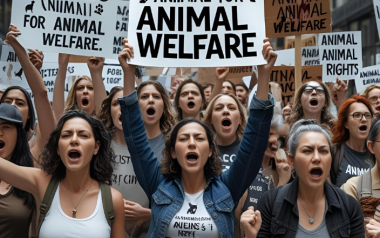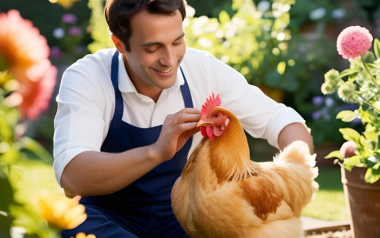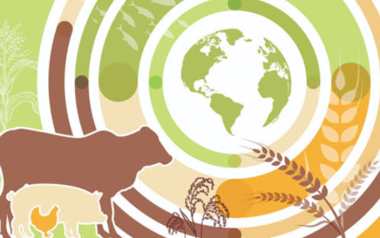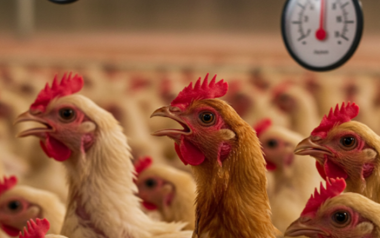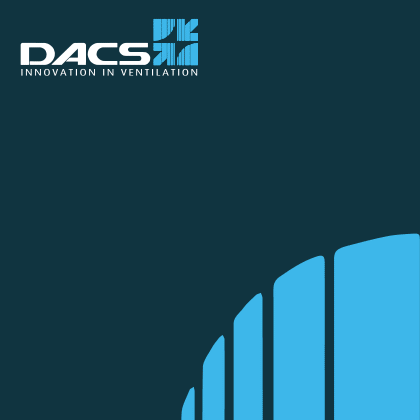FASTING
19 Mar 2021
Reducing dips in yield and quality of chickens in pre-slaughter phase
During the rearing and fattening stages of chickens, technical monitoring must guarantee the final objectives at all times. However, a lack of control at pre-slaughter phase could reduce the yield and impairs quality of the final product. Fasting, catching and transportation are some of the critical points prior the slaughter. Look at here how these factors can affect the processing of birds.
Available in other languages:
Content available at:
Español (Spanish)
During the rearing and fattening stages of chickens, technical monitoring must guarantee the final objectives at all times.
TECHNICAL MONITORING OF THE FLOCK
- The chicks leave hatcheries in specially designed trucks that reduce all factors affecting their comfort and viability.
- The houses and farms have been carefully prepared to receive the new flock.
- Technical and operational staff have all the necessary infrastructure to constantly evaluate the birds. This helps in avoiding health or other problems that impact their quality and fattening process.
- When events arise that jeopardize the technical and / or economic results of the flock, a corresponding action plan comes into motion immediately.
All farm staff and company management are closely watching the fattening process.
When processes fail, we get a lack of quality raw material to send to the processing plant. Simply put, when there is no business, we lose financial recovery of the investment.
When the birds have reached the weight required by the slaughterhouse, then the pre-slaughter stage begins. Three critical activities are carried out here, that greatly impact the quality and performance of the birds to be processed:
- Fasting
- Collecting and caging
- Transportation to the slaughterhouse
At this time, the investment of the company is still represented by the live chickens. In the next 14 hours (12h fasting and 2h of processing), they will be transformed into meat fit for human consumption.
It is common that the pre-slaughter is not formally assigned to a specific area of the company.
On one hand, the production group believes its responsibility ends the moment the fasting order is given.
On the other, the processing plant considers its responsibility begins when the birds arrive at its facilities, despite the fact that, among other details, the cages are often vacated, washed and disinfected in the plant before being returned to the farms.
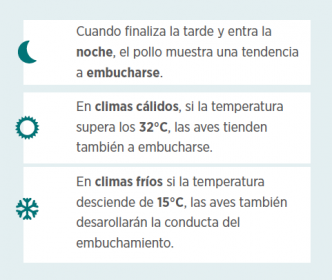
It’s been established between 8 to 12 hours, to achieve an adequate evacuation of the intestinal tract.
Insufficient Fasting: If it is less than 8 hours, they will present the problems of insufficient fasting
Over-fasting If it is longer than 12 hours, the problems associated with over-fasting may appear.
It is important to bear in mind that there are special environmental conditions that affect the successful evacuation of the intestinal tract.
These were discovered by Dr. Julie Northcutt of the University of Georgia, USA, 1997.
FACTORS TO MONITOR
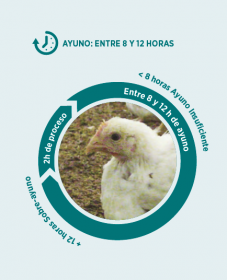
Bell or nipple drinkers should always provide sufficient water. Remember that chickens are sectorial. If they can’t find water where they usually drink it, they lie down. Water facilitates digestion, since it moistens the food.
BIRD ACTIVITY
Birds must be active. To this end, staff working in the houses should walk slowly and periodically to entice birds to move. When they lie down permanently, feed passage slows down due to the pressure on the area of the body that is in contact with the litter.
TO CONTINUE READING REGISTER IT IS COMPLETELY FREE
Access to articles in PDF
Keep up to date with our newsletters
Receive the magazine for free in digital version
REGISTRATION
ACCESS
YOUR ACCOUNT
LOGIN
Lost your password?






